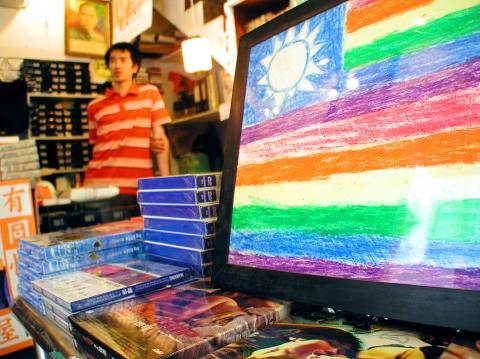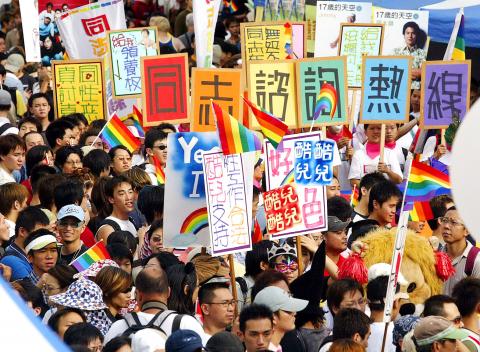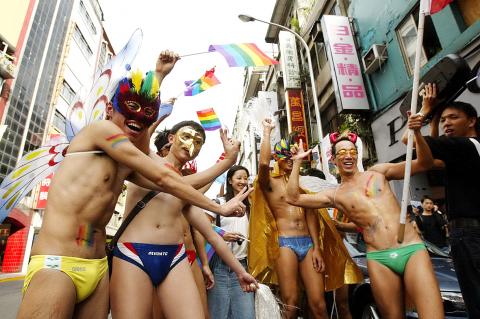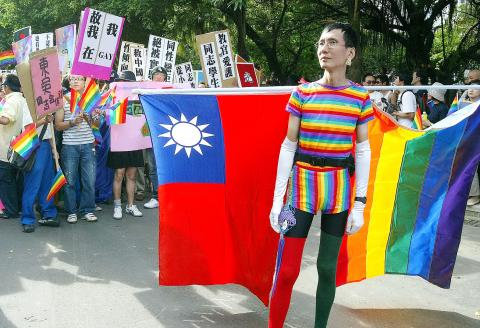Oct. 30 to Nov. 5
As the rainbow flag rose up at Vieshow Cinema in Taipei, Hsieh Pei-chuan (謝佩娟) says her friends “could not help but want to cry, to hug someone, to cheer and scream.”
The occasion, described in the book Raise the Rainbow Flag (揚起彩虹旗) was the first Taipei LGBT Festival (台北同玩節, the “Q” was added later), held in September 2000. It was the first lesbian, gay, bisexual, transgender and queer (LGBTQ) event sponsored by the Taipei City Government, who pledged NT$1 million to the cause.

Photo: Kuang Hsueh-yung, Taipei Times
It had been a long struggle by early activists to get to that point. According to Wu Tsui-sung’s (吳翠松) study, Homosexuals in the News (報紙中的同志), from 1981 to 1985 they were mostly treated as deviants and criminals in the media. From 1985 to 1990, they were mostly associated with HIV/AIDS due to the first reported case in the nation in 1984, where the patient happened to be gay. Finally, from 1991 to 1995, the reports shifted to being about them fighting for their rights.
By the time Taiwan’s first LGBTQ Pride Parade took place on Nov. 1, 2003 in Taipei, the reports were pretty balanced and substantial. Even though the parade did not make any of the front pages, each newspaper gave significant space to the inaugural event.
“At last, Taiwan has its own pride parade,” the Liberty Times (the Taipei Times’ sister newspaper) announced.

Photo: Wang Yi-sung, Taipei Times
“With these events, straight people can no longer be ostriches and pretend that homosexuals don’t exist,” stated an editorial the following day.
EARLY DAYS
Homosexuality started entering the public consciousness in the 1960s when today’s 228 Peace Memorial Park became a gathering spot for gays. But the media rarely discussed homosexuality until the 1970s, when there were several murder cases involving gay men.

Photo: Wang Yi-sung, Taipei Times
Discrimination would continue well into the 1980s, when the Central Daily News reported that the police were raiding possible homosexual establishments and quoted the city police chief’s plans to “eradicate them completely,” encouraging citizens to report homosexuals who “disrupt good social customs.” Things only got worse with the HIV/AIDS debacle.
Chen Juo-ming (陳若明) writes in A Study of Taiwan’s Homosexual Rights Movement After the War (戰後台灣同志運動之歷史考察) that the first homosexual organization Between Us (我們之間) appeared in 1990, opening the era for the organized LGBTQ rights movement.
Chen stresses that the movement did not come out of nowhere. In 1986, Chi Chia-wei (祁家威) began his personal battle coming out on national television and also applying for a notarized marriage license with another man.

Photo: Wang Yi-sung, Taipei Times
Gay and lesbian bars also started popping up in the 1980s, and by the end of the decade homosexual consciousness had awakened due to the amount of reporting on the AIDS/HIV issue, Chen writes.
But the tipping point was in 1992, when a Taiwan Television (TTV, 台視) reporter snuck into a lesbian bar and secretly shot footage, coupled it with an interview with androgynous singer Pan Mei-chen (潘美辰) and took her words out of context to make it appear that she admitted to being a lesbian.
This led to a public outcry, including an open letter signed by various media and arts professionals calling for society to respect homosexuals. The television station was forced to apologize.
Throughout the 1990s, the movement grew in the form of organizations (especially in universities), publications, discussions, exhibitions, demonstrations and other cultural activities. The Tong-Kwang Light House Presbyterian Church (同光同志長老教會) was also formed during this time as well as the Taiwan Tongzhi Hotline Association (台灣同志諮詢熱線).
However, Chen writes that discriminatory incidents continued to take place at the same time, especially repeated police raids on gay establishments, including the AG Gym incident where they forced two men to pose for photos simulating anal sex and charged them with public obscenity.
TAKING TO THE STREETS
In February 1997, the gay community held a “protest ball” at National Taiwan University to voice their displeasure again at the Taipei City Government promising to fund a LGBTQ event and later going back on their word. During the 1998 mayoral elections, it became imperative for the candidates to secure minority votes, with both Ma Ying-jeou (馬英九) and Chen Shui-bian (陳水扁) signing a declaration that would protect gay rights.
Ma kept his promise and held the first city-sponsored homosexual event in 2000, during which Chen, who had become president by then, announced that “homosexuality is not a crime nor a disease.”
By 2002, discussions of having a parade began, which led to it becoming a reality the following year. The government helped fund the first parade, but because of dissenting voices by city councilors, it has been self-funded since the second edition. By 2006, it was widely considered the largest LGBTQ parade in East Asia.
Why march? Ever since the lifting of martial law in 1987, marches to raise awareness about certain issues had been taking place, but the long-stigmatized gay community never had a chance.
“Taking to the streets as homosexuals signified the breaking free of their past behavior of having to hide or disguise themselves,” writes Lee Hsin-fang (李欣芳) in the study, Strategies and Process of the Taiwan Lesbian and Gay Movement (台灣同志運動策略與過程之探討).
Not only was it for them to show themselves to society, it was also to show themselves to each other, for spiritual support, for other homosexuals to know that they were not alone.
However, Lee writes that being so visible also runs the risk of giving people the impression that homosexuals are no longer stigmatized. This is why each year’s parade has a clear theme to reinforce the fact that there is still much to be done.
“The oppression and discrimination against homosexuals has not disappeared because of the parade,” she writes. “Because they are no longer isolated as they were in the 1990s, because of the advance in information technology and proliferation of homosexual events … because of the sheer number of participants in the parade, it might mislead the [LGBTQ] community and the rest of society to think that the gay rights movement had already succeeded.”
“Having this many people marching in a parade doesn’t mean that this many people have come out of the closet in real life,” she adds. “And being able to march in the street as a collective group doesn’t mean that each individual can live their everyday lives without fear or hesitation.”
Taiwan in Time, a column about Taiwan’s history that is published every Sunday, spotlights important or interesting events around the nation that have anniversaries this week.

Taiwan has next to no political engagement in Myanmar, either with the ruling military junta nor the dozens of armed groups who’ve in the last five years taken over around two-thirds of the nation’s territory in a sprawling, patchwork civil war. But early last month, the leader of one relatively minor Burmese revolutionary faction, General Nerdah Bomya, who is also an alleged war criminal, made a low key visit to Taipei, where he met with a member of President William Lai’s (賴清德) staff, a retired Taiwanese military official and several academics. “I feel like Taiwan is a good example of

March 2 to March 8 Gunfire rang out along the shore of the frontline island of Lieyu (烈嶼) on a foggy afternoon on March 7, 1987. By the time it was over, about 20 unarmed Vietnamese refugees — men, women, elderly and children — were dead. They were hastily buried, followed by decades of silence. Months later, opposition politicians and journalists tried to uncover what had happened, but conflicting accounts only deepened the confusion. One version suggested that government troops had mistakenly killed their own operatives attempting to return home from Vietnam. The military maintained that the

Before the last section of the round-the-island railway was electrified, one old blue train still chugged back and forth between Pingtung County’s Fangliao (枋寮) and Taitung (台東) stations once a day. It was so slow, was so hot (it had no air conditioning) and covered such a short distance, that the low fare still failed to attract many riders. This relic of the past was finally retired when the South Link Line was fully electrified on Dec. 23, 2020. A wave of nostalgia surrounded the termination of the Ordinary Train service, as these train carriages had been in use for decades

Lori Sepich smoked for years and sometimes skipped taking her blood pressure medicine. But she never thought she’d have a heart attack. The possibility “just wasn’t registering with me,” said the 64-year-old from Memphis, Tennessee, who suffered two of them 13 years apart. She’s far from alone. More than 60 million women in the US live with cardiovascular disease, which includes heart disease as well as stroke, heart failure and atrial fibrillation. And despite the myth that heart attacks mostly strike men, women are vulnerable too. Overall in the US, 1 in 5 women dies of cardiovascular disease each year, 37,000 of them